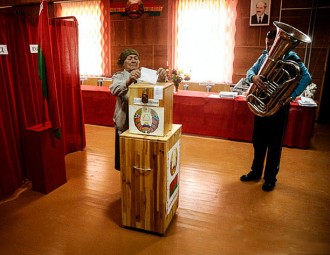OSCE published the final report on presidential elections in Belarus
 Sergei Balai
Sergei Balai
The report contains 13 recommendations for putting the Belarusan electoral legislation in compliance with OSCE commitments.
OSCE/ODIHR Election Observation Mission Final Report indicates that during the election on October 11, 2015 stacks of ballots indicating ballot box stuffing were noted in five polling stations. A large number of IEOM observers were not allowed access to check the voter lists, and those who allowed noted seemingly identical signatures in 47 polling stations. Such observations point towards serious violations as well as cast doubts over the accuracy of the reported results.
The OSCE report enumerates 13 priority recommendations and 17 other recommendations to assist the authorities of Belarus to further improve the electoral process.
Priority recommendations:
- A comprehensive legal reform should be considered and developed on the basis of previous OSCE/ODIHR recommendations, including OSCE/ODIHR and Venice Commission Joint Opinions, and through an inclusive process with all relevant stakeholders.
- The Electoral Code should be amended to include substantial procedural safeguards that ensure integrity and transparency of all stages of the electoral process, in particular the composition of election commissions, the verification of support signatures, observers’ rights, the conduct of early and mobile voting as well as an honest counting and tabulation of votes.
- As previously recommended, all relevant laws and decrees should be amended to ensure that any restrictions on fundamental freedoms have the character of exceptions, be imposed only when necessary in a democratic society, be proportionate to a legitimate aim and not be applied in an arbitrary and overly restrictive manner.
- To ensure a genuinely pluralistic composition of election commissions and to promote confidence in the election administration, consideration should be given to revising the system for nominating and appointing election commissions and to ensuring the inclusion of commission members nominated by contestants at all levels of the election administration.
- Authorities should ensure that there is a clear separation of the State and partisan interest, equal treatment of contestants before the law and that the campaign is conducted in a fair and free environment. Authorities should ensure that campaigning is held in line with national legislation, including without abuse of official position, involvement of employees or other subordinate persons, and support for campaigning provided by state-subsidized associations.
- Authorities could reconsider the requirement for accreditation and allow journalists who are members of domestic media to work for foreign media and Belarusian media based abroad.
- Consideration could be given to extending the composition of the MSB to include representatives of private media and the BAJ to reinforce its independence and instill public confidence in the impartiality of its work. The MSB should be mandated and sufficiently resourced to conduct consistent monitoring of media campaign coverage to more effectively fulfill its role.
- The law should be amended to prescribe that every voter has the right to file complaints against all decisions, actions and inactions of the election administration resulting in an infringement of his/her electoral rights.
- Measures should be taken to ensure unrestricted access of citizen and international observers to observe all aspects of the electoral process throughout, voting, counting and tabulation.
Observers should have the right to familiarize themselves with the content of voter lists and receive a certified copy of the results protocols.
- The system for early voting should be reviewed. If maintained, the same safeguards as on election day should apply, including the requirement for the PEC to be in quorum.
Authorities could consider having a single protocol containing daily information, including the number of voters on the voter list, which would remain on public display in the polling station throughout early voting and until the end of the count.
- Clear and transparent procedures for counting should be established and strictly implemented. Consideration should be given to announcing and displaying the choice on each ballot. The tallying of results and completion of results protocols should be conducted in an open manner that provides for meaningful observation.
- To enhance transparency and accountability, results should be published and disaggregated by polling station, and include results from early voting separately for each candidate, the number of valid and invalid votes, votes cast against all candidates, and the number of spoiled ballots.
- Authorities should consider all allegations of serious violations and investigate them fully, bringing those who are proven to have been involved to justice.
On January 28 Michael Georg Link, the Director of OSCE Office for Democratic Institutions and Human Rights arrived in Minsk with a two-day visit. He plans to have a number of meetings with Belarusan officials, as well as representatives of the Central Electoral Committee.
-
03.01
-
07.10
-
22.09
-
17.08
-
12.08
-
30.09








































